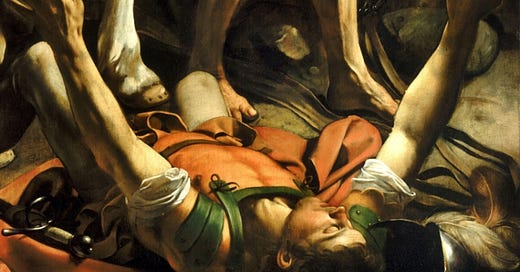Dear Friend,
The end of last week found Emily and me in humid Gainesville, Florida, where among the endless Spanish moss and Gators fans, we were honored to share two lectures and a lunch symposium with the wonderful people of the Christian Study Center at the University of Florida, led by the wonderful L.M. Sacasas. (We’ll hope to share some of those thoughts here in the coming weeks.) It highlighted for us that the simple conversations that we are trying to encourage, including here at The Rose Fire, through our other writing and speaking, and through Emily’s art practice are well-timed.
People are yearning to understand the depth and dimension that Beauty (sure, with that capital B) has in a world that has somehow become both photogenic and ugly. People, as a general rule, want what is real and what is good. The gap between that and our present moment is wide, and we all have a role to play in trying to bridge it.
In that continuing spirit, I am glad to share this fresh poem today, with a recording of me reading it, and a few thoughts on it below for my (very kind) paid subscribers.
-Paul
Damascus Road "When his eyes were opened, he saw no man: but they led him by the hand..." - Acts 9:8 The light was violet, cinnabar, and green. One cannot see what one has never seen. I do not think I know quite what I mean. The light was orange, somewhat-pink, and pink. Christ dumped ball bearings on my roller rink. I do not mean what I might think I think. The light was purple, silvery, and teal. I kicked the pricks so hard I could not feel. I do not think that I was ever real. The light was yellow, ebony, and blue. The scales of some blind fishes rub off too. I cannot think now, but I think of you.
The language of religious conversion is overused, often well past the point of cliche. As the most obvious example, “born again” has become a phrase that, for many people in America at least, conjures a whole feel with it, perhaps some measure of cultural ignorance or even gullibility. This is a shame of course—that the central mystery of an ancient and beautiful faith should be so cheapened or diluted that one cannot really hear it anymore. What the catechumens once whispered joyously in the catacombs on the sacred night of vigil before the Easter dawn is now drawled by big-haired TV evangelists trawling the late hours for credit card numbers and promising the latter rain.
So it is a mildly dangerous thing to take as a theme one of the great conversions—that of Saul (who would become Paul), in Chapter Nine of the Book of the Acts. It is so famous an account that it has generated its own phrase: road to Damascus refers to a life-changing experience. Before. After. The original come-to-Jesus moment. To reference it is mildly dangerous, because it is so easy to lose the reader. Maybe they will glaze at the obviousness of the percieved piety. Or maybe they will simply feel that they know the story already, and can safely discard it. The religious may feel they know it already. Those outside faith may feel it is simply not for them.
But it is the purpose of the poet to try to say the old things small and newly. And so, I find myself on the road to Damascus, and pointing at the sun. The reason is that the message of this greatest and most iconic of conversions holds an image that each of us might do well to remember: that we can be changed.
Keep reading with a 7-day free trial
Subscribe to THE ROSE FIRE to keep reading this post and get 7 days of free access to the full post archives.




